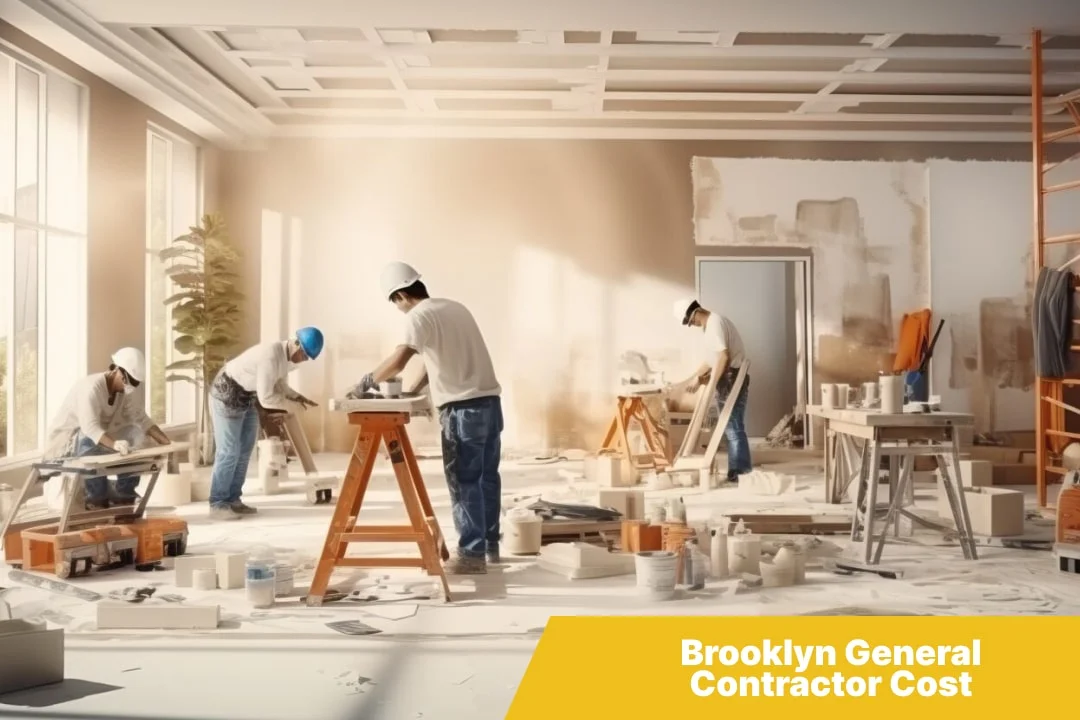
Brooklyn General Contractor Cost
Your apartment needs work. Not just “slap some paint on it” work, but real, substantial renovation work. Maybe you’re combining two rooms into one. Perhaps you’re finally finishing that basement. Or maybe you’re doing what half of Brooklyn seems to be doing—completely reconfiguring your space to actually work for how you live.
And now comes the uncomfortable part: calling contractors, getting estimates, and trying to understand why the numbers are all over the map. One quote comes in at $45,000. Another says $78,000 for what seems like the same work. A third won’t even give you a number without a $500 consultation fee.
Let’s decode the brooklyn general contractor cost mystery so you know what you’re actually paying for and why.
Why Brooklyn Isn’t Like Anywhere Else
Before we talk numbers, let’s address why hiring a general contractor in Brooklyn costs more than virtually anywhere else in the country. And no, it’s not just because contractors think they can charge more in brownstone neighborhoods.
Brooklyn presents challenges that don’t exist in suburban single-family homes. Your building was probably built between 1890 and 1940, which means surprises hide behind every wall. You share space with neighbors who have opinions about your renovation noise. Street parking for dumpsters requires permits that cost real money. Material delivery means navigating congested streets where a lumber truck can’t just pull into your driveway because you don’t have a driveway.
Then there’s the regulatory environment. New York City doesn’t mess around with permits, inspections, and code compliance. Your contractor needs to be licensed, insured, and intimately familiar with NYC building codes that differ significantly from everywhere else.
These factors aren’t excuses—they’re the reality that shapes pricing.
The Real Cost Breakdown: What Brooklyn Homeowners Are Paying
Here’s what actual renovation projects are costing in Brooklyn right now:
Small-Scale Projects: $15,000 – $35,000
This covers focused work on a single room or specific scope. Kitchen upgrades (without moving plumbing), bathroom renovations, bedroom reconfigurations, or converting a space into a home office.
You’re typically working within existing footprints, making cosmetic and functional improvements without major structural changes. The work is substantial but contained.
Mid-Range Whole Apartment Renovations: $80,000 – $150,000
This is where most complete apartment renovations land. You’re updating everything—kitchens, bathrooms, flooring throughout, new electrical and plumbing work, possibly some wall removal or reconfiguration. Basically taking an outdated space and bringing it into 2025.
Professional contractors like Skyline NY Inc specialize in these comprehensive projects that balance quality craftsmanship with realistic budgets.
Major Renovations and Additions: $200,000 – $400,000+
Now we’re talking structural work, possible additions, combining apartments, creating entirely new layouts. Architects are involved. Engineers sign off on plans. You’re essentially rebuilding your space from scratch.
This includes moving load-bearing walls, adding bathrooms, expanding kitchens significantly, upgrading entire building systems, and high-end finishes throughout.
Gut Renovations of Brownstones: $300 – $600+ per square foot
For whole-house brownstone renovations, multiply your square footage by $300-$600 depending on finishes and scope. A 2,000 square foot brownstone gut renovation easily runs $600,000 – $1,200,000 when you include everything.
What Actually Determines Your General Contractor Cost
Understanding cost drivers helps you budget smarter and negotiate better:
Labor Is Your Biggest Expense
In Brooklyn, skilled labor doesn’t come cheap. A quality carpenter, electrician, or plumber charges $75-$150+ per hour. Your general contractor coordinates all these specialists, manages the project timeline, handles permits, deals with inspections, and ensures everything meets code.
General contractor fees typically run 15-25% of total project costs, but this includes massive value: project management, problem-solving, quality control, and being the single point of accountability when things go wrong.
Scope and Complexity
Moving a light switch? Relatively simple. Relocating your kitchen to a different floor? That’s complex, expensive, and time-consuming.
Every decision that changes your building’s fundamental systems—plumbing, electrical, HVAC, structural—multiplies costs. Every wall you move, every system you upgrade, every permit you need adds both time and money.
Material Choices Across the Spectrum
You can renovate a kitchen with IKEA cabinets or custom millwork. Both are “cabinets,” but they’re not remotely the same price. Same logic applies to flooring, tile, fixtures, appliances, and basically every material choice.
The smart middle ground: quality materials that will last, but not necessarily the ultra-premium options that add cost without adding proportional value.
Your Building’s Age and Condition
Renovating in a 1920s building versus a 2005 condo means completely different challenges. Older buildings hide problems—outdated wiring, compromised plumbing, structural issues that have been “solved” with creative (read: incorrect) fixes over decades.
Opening walls in pre-war buildings is like archaeological excavation. You never know what you’ll find, and it’s rarely good news.
Permits and Compliance
New York City requires permits for most substantial work. Depending on scope, permit costs range from $1,500 to $10,000+. Then there’s the time factor—permits can take weeks or months to secure, especially if you’re in a landmark district or need special approvals.
Your general contractor handles this bureaucratic maze, which is worth its weight in gold if you value your sanity.
The Hidden Costs That Catch People Off Guard
Every experienced renovator learns these lessons the hard way:
Living Situation During Construction: Where do you live during a whole-apartment renovation? Some people move in with family. Others rent temporary housing. A few brave souls try to live through construction (don’t recommend). All these options cost money, time, or mental health.
Discovery Issues: Budget 15-20% extra for problems you discover once walls are open. This isn’t padding—it’s reality. That small water stain might be massive mold behind the wall. Those “solid” joists might be compromised. Plan for surprises.
Furniture and Storage: Your stuff needs to go somewhere during major renovations. Storage units run $100-$400+ monthly in Brooklyn. Moving costs (even temporary moves) add up quickly.
Temporary Utilities and Protection: Dust containment systems, temporary bathrooms, protective coverings—these aren’t glamorous but they’re necessary, and they cost money.
The Cascade Effect: Renovate your kitchen and suddenly your dining room looks shabby. Update your bathroom and your bedroom needs work. Budget for the psychological domino effect of seeing your renovated spaces next to un-renovated ones.
How to Actually Save Money Without Sacrificing Quality
Smart homeowners don’t just spend less—they spend strategically:
Get the Scope Right From the Start: Changing your mind mid-project is expensive. Every modification means change orders, timeline delays, and budget increases. Invest time upfront getting the plan right.
Respect Existing Systems: Want to save tens of thousands? Keep plumbing and electrical where they already are whenever possible. Design around existing infrastructure rather than relocating it.
Timing Matters: Contractors have busy and slow seasons. Book during slower periods (typically January-March) and you might negotiate better rates. Flexibility on start dates can save 10-15%.
Bundle Work Intelligently: Renovating bathroom and kitchen separately means mobilizing contractors twice, securing permits twice, dealing with disruption twice. Doing comprehensive work at once is more efficient and often cheaper overall.
Material Selection Strategy: Splurge on structural elements and systems that last decades (plumbing, electrical, framing quality). Economize on aesthetic elements that can be updated later (paint colors, cabinet hardware, light fixtures).
When you’re ready to discuss your specific project, getting a professional assessment helps translate your vision into realistic budgets and timelines.
Choosing Your General Contractor: The Decision That Changes Everything
Your general contractor choice impacts everything—timeline, quality, budget adherence, stress levels, and final results. This decision deserves serious attention.
Non-Negotiable Requirements:
- Active NYC general contractor license (verify independently)
- Comprehensive liability insurance and workers’ compensation
- References from recent Brooklyn projects you can visit
- Written contracts detailing everything
- Clear payment schedules tied to milestones
- Experience with your building type and era
- Transparent communication about problems and solutions
Warning Signs to Run From:
- Requesting more than 10% deposit upfront
- Reluctance to provide references or proof of insurance
- Verbal-only agreements or handshake deals
- Prices dramatically lower than other quotes (they’re cutting corners somewhere)
- Pressure to sign immediately without time to review contracts
- Inability to explain how they’ll handle permits and inspections
Questions to Ask Every Potential Contractor:
- How do you handle unexpected discoveries and associated costs?
- What’s your payment schedule and how is it tied to project milestones?
- Who manages day-to-day on-site work?
- How do you communicate progress and problems?
- What’s your typical timeline for a project like mine?
- How do you handle permit acquisition and inspections?
Investment Returns: The Financial Reality
Most renovations aren’t purely financial investments—you’re improving your living space for yourself. But since everyone wonders about ROI:
According to the National Association of Realtors Remodeling Impact Report, major renovations in high-cost markets like Brooklyn typically recoup 55-75% of costs at resale. Kitchen and bathroom renovations tend toward the higher end of that range.
But here’s what matters more: quality renovations make your home more sellable, more livable, and more enjoyable for however long you own it. The real ROI is measured in daily quality of life over years, not just resale percentages.
Timeline Expectations: Plan for Reality
Small projects (single room): 3-6 weeks Medium renovations (kitchen + bathroom): 8-14 weeks Large whole-apartment renovations: 16-24 weeks Brownstone gut renovations: 6-12+ months
Brooklyn-specific factors add time: permit delays, co-op approvals, material delivery in congested neighborhoods, discovering problems in older buildings. Any contractor promising dramatically faster timelines is either cutting corners or not being realistic.
Understanding Payment Structures
Typical payment schedules for brooklyn general contractor cost projects:
- 10% deposit to secure schedule and begin planning
- 25% at project start when materials are ordered
- 30% at substantial progress milestone (usually 50% completion)
- 25% at substantial completion
- 10% final payment after walk-through and punch list completion
Never pay more than 10% upfront. Never pay final amounts until work is complete and you’re satisfied. Payment schedules should be in writing and tied to specific, measurable milestones.
Your Next Steps
Understanding what drives brooklyn general contractor cost helps you budget realistically and make informed decisions. Most homeowners underestimate costs by 20-30% because they don’t account for all the factors we’ve discussed.
Start with clarity: What problems are you solving? What would genuinely improve your daily life? What’s your actual budget including contingencies?
Then find a contractor who understands Brooklyn’s unique challenges. Visit Skyline NY Inc to see examples of successful renovations that balanced quality, budget, and realistic execution.
Your renovation is a significant investment in both money and disruption to your life. But when executed properly with the right contractor, it transforms your living space in ways that pay dividends every single day.
Stop living with spaces that don’t work. Start planning the renovation that makes your home genuinely yours.
Ready to discuss your renovation vision? Explore renovation possibilities at Skyline NY Inc or schedule a consultation to talk about your specific project, timeline, and budget.


